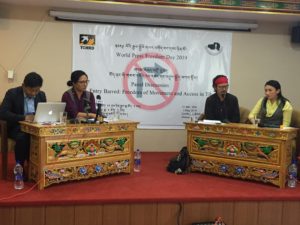
Panelists:(from left) Tenzin Dalha, Tenzin Paldon, Tenzin Tsundue (moderator) and Pema Tso,
Photo: Contact / Lha
Tibetan journalists gathered in Dharamshala to mark World Press Freedom Day on May 3 and to voice their concerns about the declining access to information and reporting from Tibet due to the systematic restrictions imposed by the Chinese government on the right to freedom of movement and access for the journalists.
The Tibetan Centre for Human Rights and Democracy (TCHRD) and Association for Tibetan Journalists (ATJ) organised a panel discussion entitled Entry Barred: Freedom of Movement and Access in Tibet which featured panelists Tenzin Paldon, editor-in-chief of Voice of Tibet (VoT); Pema Tso, a senior editor with Tibet Times and Tenzin Dalha, a researcher at the Tibet Policy Institue (TPI). The discussion was moderated by Tibetan writer and activist, Tenzin Tsundue.
Tibet Times’ editor Pema Tso, who was born and brought up in Tibet before escaping to exile, said that in Tibet everything is government controlled and Tibetans don’t even have the right to say that they don’t have press freedom in Tibet. Pema stressed that the situation inside Tibet is such that there is no way to provide updates on any cases filed by reporters from exile or anywhere in the world.
Paldon was asked about the challenges she faces as the Chief Editor of VoT. She said “getting information from Tibet” and “verifying the information” are the challenges. She also shared one of the challenges of reporting the stories of Tibetans living inside Tibet: they need to be double checked before publishing out of consideration of the possible serious consequences for the people concerned.
Tenzin Dalha spoke about internet censorship and growing surveillance inside Tibet. He said that the internet has become a huge problem to the Chinese government. “Despite active control from the government, millions of people under the Chinese government continues to use proxy and VPNs to bypass censorship”, said Dalha.
Pre-recorded videos showing interviews with Paul Mooney, a former correspondent for the South China Morning Post (SCMP); Dolma, a former reporter with Qinghai TV and Abhishek Majumdar, the playwright who wrote Pah-La, the play performed at the Royal Court Theatre in London, United Kingdom, last month, were screened before the panel discussion.
TCHRD and ATJ stated that the Chinese authorities forbid independent reporting trips to the Tibet Autonomous Region (TAR) and other Tibetan areas in Sichuan, Gansu, Qinghai and Yunnan provinces. Journalists reporting from Tibet are under constant surveillance and exposed to intimidation, and their sources to harassment. They also highlighted that in the FCCC report, a foreign journalist based in Beijing, after visiting Tibet in 2016 said reporting conditions were freer in North Korea than in Tibet.
The participants at the gathering agreed to put out a call to the international community to engage with China and exert pressure on China to remove all policies and practices that violate the right to freedom of movement and travel in Tibet.




 Print
Print Email
Email